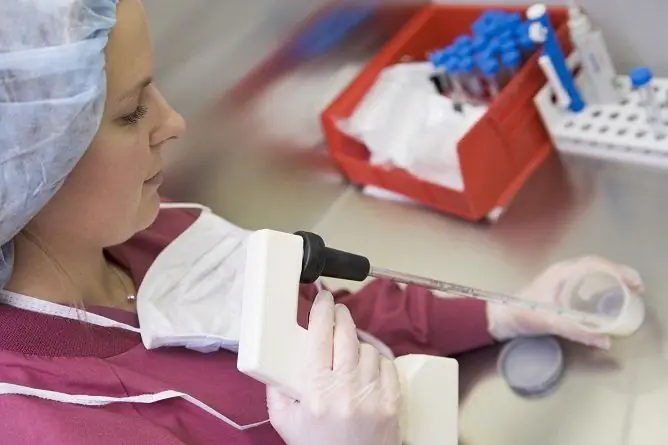- Author Rachel Wainwright wainwright@abchealthonline.com.
- Public 2024-01-15 19:51.
- Last modified 2025-11-02 20:14.
Weight-bearing hormones in women
The content of the article:
- Hormones and excess weight
- Leptin
- Catecholamines
- Thyroid hormones
- Insulin
- Ghrelin
- Testosterone
- Estrogens
- Pituitary hormones
- Glucocorticoids
- Video
The role of hormones responsible for weight gain in women cannot be underestimated. The increase in body weight due to adipose tissue is not only an aesthetic problem, but also a medical one. Metabolic disorders in obesity leads to the development of severe concomitant diseases. The regulation of fat metabolism is carried out by the nervous and endocrine systems. Fighting excess weight will be more successful if you have a clear idea of how adrenaline, cortisol, insulin, leptin, ghrelin, testosterone, estrogens, prolactin, thyroxin, thyroid stimulating hormone (TSH), somatotropic (STH) and adrenocorticotropic (ACTH) hormones affect lipid metabolism …

Body weight is regulated by hormones, obesity is often the result of hormonal imbalance
Hormones and excess weight
The process of deposition and mobilization of fat from the depot of the human body is controlled by hormones and the central nervous system. The synthesis of fats is possible not only from fatty products, but also from carbohydrate and protein metabolism. Fats, unlike carbohydrates, may not be used up immediately for energy. They are deposited and stored in a concentrated form for a long time - obesity develops.
Fats are stored until they are used. Weight loss occurs as a result of the enzymatic breakdown of fats into their constituent fatty acids. This metabolic process is called lipolysis and is stimulated by:
- adrenaline;
- testosterone;
- leptin;
- thyroxine;
- TSH;
- STG;
- ACTH.
Promote fat deposition and inhibit fat mobilization:
- insulin;
- glucocorticoids;
- prolactin;
- estrogens.
Leptin
The accumulation of lipids is carried out in special cells - adipocytes. Adipocytes synthesize a protein hormone called leptin. The word is of Greek origin: λεptός - thin. Hormone receptors are found in the hypothalamus. Through them, a signal is transmitted to the brain about the amount of adipose tissue in the body.
Leptin activates the formation of uncoupling proteins of brown fat, reduces the production of neuropeptide Y, which increases appetite and stimulates lipid synthesis. The net effect of leptin is to reduce appetite and increase the breakdown of fat. Disruption of the interaction of the hormone with hypothalamic receptors is one of the reasons for the development of obesity.
Normal levels of leptin in the blood serum of women are 3.63-11.1 ng / ml. Leptin levels rise at night. Inadequate or short sleep at night is a contributing factor to weight gain.
Catecholamines
The catecholamines produced by the adrenal cortex are hormones and neurotransmitters. As the latter, they carry out the transfer of electrochemical impulses between nerve cells. Adrenaline, norepinephrine and dopamine are catecholamines. In terms of the degree of influence on lipid metabolism, adrenaline takes precedence.
Stress, anxiety, trauma, physical activity lead to a sharp increase in adrenaline levels, it is not for nothing that it is called the hormone of fear. Adrenaline affects almost all types of exchange. It enhances the breakdown of fats and inhibits their synthesis, causes an increase in blood glucose levels, activates heat generation in tissues, increases the excitability of the nervous system and the effectiveness of adaptive reactions. The norm of adrenaline in the blood of an adult is 1.0-3.07 nmol / l.
Thyroid hormones
The thyroid gland produces thyroxine (T4) and triiodothyronine (T3). Thyroxine has the greatest influence on the rate of metabolic processes. It has a fat-mobilizing effect, helps to increase the breakdown of fats in the liver. With excessive secretion of T4, the absorption of fat in the intestine and its breakdown are activated, and the level of total cholesterol decreases. Therefore, increased thyroid function is accompanied by weight loss.
With thyroxine deficiency, the consumption and energy use of fats from the depot slows down, the content of atherogenic lipids increases. This provokes the development of atherosclerotic vascular changes. A hypofunction of the thyroid gland leads to overweight.
Normal values of thyroxine and triiodothyronine in the blood:
- T4 total 51.0-142.0 nmol / l;
- T4 free 0.01-0.03 nmol / l;
- T3 total 1.07-3.13 nmol / l;
- T3 free 3.9-6.7 pmol / l.
Insulin
Special cells of the islets of Langerhans in the pancreas are the site of synthesis of a peptide hormone called insulin. Elevated blood glucose is its main stimulant for production and excretion. Insulin plays an important role in the metabolism of carbohydrates, proteins and lipids. Its effect on metabolism in general can be characterized as anabolic - insulin enhances the synthesis of proteins, fats and glycogen (the main form of glucose storage).
Disruption of insulin secretion is an important link in the development of obesity. This is facilitated by insulin resistance, a condition in which high insulin levels are combined with normal or increased blood glucose levels. The lack of response to hormonal effects is due to the development of tissue resistance to insulin.
Insulin contributes to the storage of glycogen and lipids in liver cells, skeletal muscle and adipose tissue. Its content is normal in women - from 3.0 to 25.2 μU / ml. During pregnancy, it is slightly higher: 6.0-27.0 μU / ml.
Ghrelin
Ghrelin is produced by cells of the gastric mucosa, interacts with the centers of the brain, stimulating the secretion of neuropeptide Y. Ghrelin makes you feel hungry. Its level rises before meals and decreases after satiety. Impaired ghrelin secretion leads to obesity or, conversely, to exhaustion.

Ghrelin is responsible for appetite, the feeling of satiety depends on its level and the rate of decrease during meals
Ghrelin is involved in coordinating the body's energy needs and in regulating the state of the psyche, because appetite grows in depressive and stressful situations. The norm is 22-30 ng / ml.
Testosterone
Testosterone is the main sex hormone in men, but it is also produced in small quantities in women. Synthesis takes place in the ovaries and adrenal cortex. Under the influence of testosterone in women, lipolysis increases, the activity of the fat storage process decreases, insulin resistance decreases, and the lipid profile of the blood improves.
After 40 years, testosterone production decreases, and fat is deposited more intensively in the abdomen. In women, it normally ranges from 11.0 to 33.0 nmol / l. Indicators depend on the method of determination and may differ from laboratory to laboratory.
Estrogens
Estradiol, estriol and estrone are sex hormones of steroid origin, produced by the female reproductive glands. Estrogens stimulate the deposition of fat, reduce the content of cholesterol in blood plasma. A woman's body accumulates fat to provide energy needs when carrying and feeding children, this mechanism is laid by nature.
Lipid metabolism and estrogen concentration are interrelated. With obesity, various menstrual irregularities and infertility are often observed. This is due to both the failure of the central regulatory mechanisms and the metabolism of sex hormones in adipose tissue. Estradiol is the most active representative of this group of steroids. Its content depends on the phase of the menstrual cycle:
- follicular phase 12.5-166.0 pg / ml;
- ovulatory phase 85.8-498.0 pg / ml;
- luteal phase 43.8-211.0 pg / ml.
Pituitary hormones
Prolactin, thyroid-stimulating, somatotropic, adrenocorticotropic hormones are produced by the anterior pituitary gland. Their effect on lipid metabolism is significant.
| Hormone | Norm | Act |
| TSH | 0.23-3.4 μIU / ml | Regulates the synthesis of T4 and T3 in the thyroid gland. The hypofunction of the gland is accompanied by a decrease in lipolysis and a tendency to be overweight. Hyperfunction enhances lipolysis processes, combined with weight loss. |
| STG | 0.01-0.97 ng / ml | Stimulates the elimination and breakdown of fat from the depot. It is synthesized during deep sleep phases. Lack of nighttime rest contributes to obesity. |
| ACTH | 2.2-0.0 pmol / l | Promotes the mobilization of fats from the depot, increases the activity of lipases, accelerates lipid oxidation. |
| Prolactin | 102-496 μIU / ml | It has a lipotropic effect. In women during lactation, excess prolactin leads to the conversion of carbohydrates to fats. |
Glucocorticoids
Glucocorticoids are produced in the adrenal cortex. Cortisol is one of the main and active hormones in this group. It is a powerful anti-stress agent. Its increased secretion enhances the synthesis of fat from carbohydrates and its subsequent storage.
For many women, an increase in cortisol levels in stressful situations increases appetite and at the same time slows down metabolism, which contributes to obesity. The time of day affects the level of cortisol concentration - the peak occurs in the morning. The norm is 171.0-536.0 nmol / l.
The influence of neurohumoral regulation on fat metabolism is not limited to the aspects considered. Obesity treatment is a complex medical problem. What hormones need to be tested for obesity, the specialist decides. But the fact that in the fight against excess weight it is necessary to check the level of hormonal levels is beyond doubt.
Video
We offer for viewing a video on the topic of the article.

Anna Kozlova Medical journalist About the author
Education: Rostov State Medical University, specialty "General Medicine".
Found a mistake in the text? Select it and press Ctrl + Enter.






